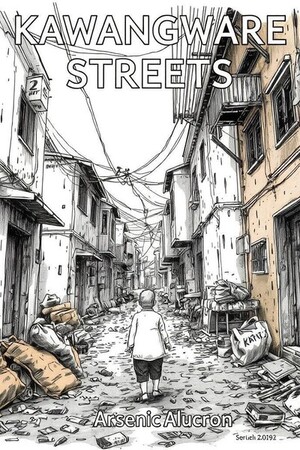Chapter 16:
THE TALE OF MUSA PART 3: Acquaintances in Cell
KAWANGWARE STREETS
The boy was fast.
He weaved through alleyways, dodged between matatus, and skipped over open drainage like a street acrobat. Musa, running on rage and hunger, chased him relentlessly.
"Stop!" he shouted, breath sharp in his throat. But the boy only glanced back once—grinning—before darting around a parked lorry.
They crossed a chaotic road. Horns blared. Brakes screeched. The boy didn’t stop. Neither did Musa.
Just as they reached a junction near the CBD, a police officer spotted the commotion. Without asking questions, he raised his gun—
BANG!
A warning shot cracked through the thick Nairobi air.
Both boys froze and the crowds scattered.
"Hands up!" the officer shouted.
Musa raised his hands, trying to speak. “He stole our—”
SLAP!
A heavy palm cracked across his cheek. The force almost dropped him.
"No one told you to speak!" the officer barked.
Before Musa could recover, cold handcuffs bit into his wrists. The street boy was cuffed too, though he looked entirely unfazed, even bored.
They were shoved into the back of a police Land Cruiser, thrown like trash. Musa sat in stunned silence as the vehicle jerked forward.
/////////////////////////////////////////////////////////////////////////////////////////////////
The holding cell was long, dim and smelly. People were crammed near the cell door, leaving the far end ominously empty.
Musa and the thief were shoved in roughly. The thief entered with the swagger of a man walking into a familiar bar.
Musa stumbled in after him, furious. “Where’s our food?” he snapped, grabbing the boy’s wrist.
Before he could get an answer, someone stepped forward. Tall, lean, with a purple cap tilted just so. His eyes were sharp, his grin sharper. His arms tucked into his pocket.
"Yo. What do you think you're doing, huh?"
The man scoffed. “You new here or something?”
“What?”
He stepped closer. “You don’t chase thieves in Nairobi, my guy. You take the L and move on. You try to be a hero, you get killed.”
“That’s not right,” Musa said, voice firm. “I won’t let anyone take my things and get away with it.”
The boy paused. Then smiled. A slow, wicked grin.
“Oh? We got a hero in here!”
Laughter rippled through the cell. Musa stood still, confused. Did he say something funny?
The man raised his voice. “Somebody tell him what happens to heroes in Kanairo!”
The whole cell chanted back in rhythm:
“They eat shit!”
Before Musa could blink, two bulky men grabbed him from behind.
“Wait! Wait!” he screamed, kicking. “I didn’t do anything—!”
They dragged him to the back of the cell—to the open space where a broken latrine door gaped like a mouth.
Then they tossed him in.
SPLASH.
Face-first into a pile of filth.
The stench hit instantly. It was suffocating. Rot, urine, vomit and shit. He gagged and vomited adding onto the pile.
Above him, the man with the purple cap leaned in.
His voice was calm. Cold. Precise.
“That was your warning shot. Next time? You get the knife.”
“Otis! Otis!” the crowd behind him chanted, pounding fists against bars.
Musa tried to crawl out, slipping on slime, crying.
Suddenly—
BANG! A metal baton cracked against the bars.
“Silence!” the officer roared. “Ngamia!”
The chanting died. Just like that.
Musa pulled himself up, covered in filth and shaking. He looked back and his cellmates were still erupting in laughter. The thief came towards him just far enough from the shit and threw him a black shirt, then stepped back without uttering a word.
Musa spent the night there using the shirt to cover the filth. He stared at the ceiling and told himself one thing:
“I am going to survive this city. No matter what it takes.”
Even if it meant becoming something else entirely.
//////////////////////////////////////////////////////////////////////////////////////////////////////
“Yo. Wake up. It’s time to go.”
The voice was muffled, distant at first. Musa stirred, eyes crusted over, shirt stiff with dried vomit. He opened them slowly to see Otis crouching above him, his purple cap crooked over a smirk.
“What?” Musa croaked, his voice hoarse.
“I said wake up. We’re free.”
Musa sat up in the corner of the cell, still dazed. “Free?”
The thief from yesterday, leaned casually against the bars. “Yeah, bro. It’s Saturday.”
*What the hell is going on? he thought to himself. Weren't these two trying to kill him yesterday? Why were they acting like he was their best friend or something?
Musa blinked. “What does Saturday have to do with anything?”
Otis stretched and cracked his neck. “Cops here don’t like paperwork. Weekends? Even worse. They don’t wanna waste time feeding us or filing charges. So, unless you're a murderer, they just throw you in, keep you for a night or two, then kick you out.”
“Otis has been here four nights,” the thief spoke laughing.
“Was almost starting to like it too,” Otis added with a shrug.
The cell door creaked open. A guard motioned lazily with his baton. “Twende! Get the Fuck out.”
As they stepped out into the hazy morning light, the thief turned to Musa, looking sheepish.
“Name’s Juma by the way,” he said, “sorry about the food…and the whole latrine thing..”
Otis nodded. “Yeah, that was rough. But it was necessary.”
Musa frowned. “Necessary?”
“Yo, man. I can tell you’re not from the streets,” Otis said grabbing his shoulder. “If we hadn’t done that, someone else would’ve. Only you’d get a knife in your ribs.”
Juma chimed in, “Kanairo is not for the softies, bro. Don’t worry you’ll get the hand of it.”
Musa didn’t respond. He clenched his jaw tight and nodded. He couldn’t believe the nerve of these guys, acting like they did him a service.
Otis sniffed the air and winced. “Damn. You reek. Let’s go get you cleaned up.”
//////////////////////////////////////////////////////////////////////////////////////////////////////////////
They walked along cracked pavements and busy intersections, away from the polished glass towers of the CBD and deeper into the city’s underbelly. The roads thinned. Noise thickened.
Soon the concrete gave way to uneven ground. A tangled maze of tin roofs and clotheslines stretched as far as the eye could see.
Kibera.
The slum pulsed with life—shouts, radios playing gengetone, vendors frying mandazi, dogs barking in alleys, smoke curling into the sky.
Raw sewage ran through shallow ditches, forming black rivers that snaked through the narrow footpaths. Children leapt over them with ease. Others filled jerrycans at shared water points. Makeshift stalls sold everything from roasted maize to pirated DVDs.
Musa gagged at the stench of rot and burning plastic.
Otis, meanwhile, moved like a king in his domain—fist-bumping vendors, teasing kids, laughing with mothers washing clothes in buckets. Everyone seemed to know him.
“Eh Otis, you’re back?” someone called out.
“Of course, mama Sifa. You think they can hold me forever?”
They turned into a narrow alley and stopped in front of a shack patched together from mabati—corrugated iron sheets weathered by sun and time. Old campaign posters were glued haphazardly to the outside. The roof slanted slightly, held down with stones and bricks.
Otis pushed open a curtain of old fabric that served as the door.
The inside was small—maybe four steps across—but well-kept. The floor was compacted dirt, swept clean. A tiny TV rested on a wooden crate in the corner, its antenna fashioned from twisted wire. A worn-out plastic chair faced it. Mattresses were stacked neatly against one wall, bound with a rope to save space.
A few metal cups hung from nails on the wall. A Bible sat on a stool next to a small speaker with blinking blue lights.
“Welcome to the palace,” Otis grinned.
Musa stepped in carefully, trying not to brush against anything. He was still half in disbelief. This was their home? He always thought that people in the city were living it up. At least that’s what Jack always said.
Otis flopped onto the chair. “Juma, take our friend here to go shower, man. He’s stinking up the whole place.”
Then he called out, “Yo, man—what’s your name?”
Musa hesitated, turning back to face them.
“…Moses.”
Juma grinned. “Come on, Moses. Let’s get you baptized again. But this time with actual water.”
They walked a few minutes deeper into the slum, past rusted doors and kids playing with tire rims. Finally, they reached a communal bath structure—three walled stalls with patched tarps for roofs. A line of jerrycans waited outside.
Juma handed Musa a bar of nearly-used soap and a plastic basin.
“No hot water, sorry. You want that, go to Karen.”
Musa didn’t respond. He stepped inside one of the stalls and shut the flap.
The water was cold. Brutally cold.
But as it splashed over him, peeling off layers of grime and filth, Musa felt something shift inside.
It was a feeling of cleansing. Resetting.
For the first time since he landed in Nairobi, he felt hopeful.
But as he rinsed his face and looked down at the brown water swirling around his feet, he realized something else:
He had forgotten about Chris. He had to find him. What if he followed him and got lost?
When he stepped out, Juma handed him an old T-shirt and pair of jeans. “Otis had extras.”
Musa dried himself off with the shirt and wore it.
Juma looked him over and nodded. “Now you look like one of us.”
FOR FURTHER INFO
Kanairo – Nickname for Nairobi
CBD - Central Business District
Ngamia – Camel
Twende – Go/ Hurry up and go
Gengetone – type of music where they use Sheng language and heavy beats.




Please sign in to leave a comment.